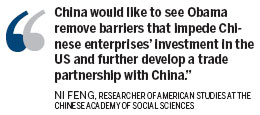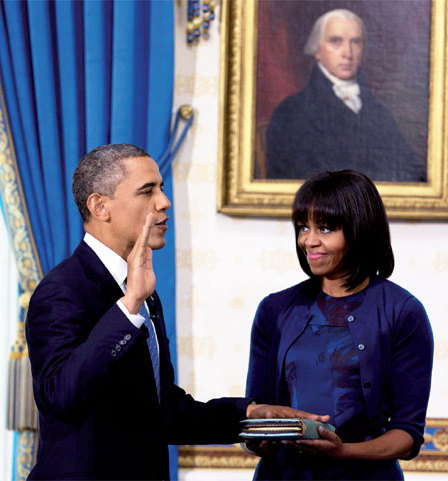Obama takes oath of office
Updated: 2013-01-21 11:51
By Chen Weihua in Washington (China Daily)
|
||||||||
|
With a portrait of former US president James Madison in the background, US President Barack Obama takes the oath of office as first lady Michelle Obama holds a Bible during the official swearing-in ceremony at the White House on Sunday. Doug Mills / Pool / Reuters |
US President Barack Obama officially began his second term at noon on Sunday following a brief oath-taking ceremony in the White House.
Flanked by his wife, Michelle, and two daughters, Malia and Sasha, the 44th US president took the oath at 11:55 am, administrated by Chief Justice John Roberts Jr, who also directed the ceremony four years ago.
On Monday morning, Obama will repeat his oath at a public ceremony on the west front of the Capital, before giving his second-term inaugural speech.
The US constitution requires that the presidential term begin on January 20, but when it falls on a Sunday, the public ceremony has been traditionally held the next day.
On Sunday morning, US Vice-President Joseph Biden also swore in at his residence in the Naval Observatory. The ceremony was administered by Justice Sonia Sotomayor and attended by 120 people.
The Bible that Obama used on Sunday was given to Michelle Obama's grandmother, LaVaughn Robinson, by her son, the first lady's father, in 1958, according to the presidential inaugural committee.
On Monday, Obama is expected to use two Bibles on which to take the oath - the Lincoln Bible that he used during his first inauguration in 2009, and the one Martin Luther King carried before the civil rights leader was assassinated in 1968. Monday happens to be Martin Luther King Day, and a federal holiday.
According to a Pew Center poll released last week, Obama began his second term in stronger favor with the public than he was over much of his first term.
His job approval rating, at 52 percent, is among the highest since the early months of his presidency. His personal approval rating, at 59 percent, has also rebounded from a low of 50 percent in the fall presidential campaign.

A higher percentage of people describe him as a strong leader, able to get things done and as someone who stands up for his beliefs. However, Obama's current job approval rating is not high compared with other two-term presidents since World War II. Since Harry Truman, only George W. Bush began his second term with a rating as low as Obama's (50 percent in January 2005).
The Pew Center report described it as a reflection of the partisan polarization in opinion surrounding both Obama and Bush. Obama's current approval rating among Republicans (14 percent) is about the same as Bush's among Democrats eight years ago (17 percent).
The report also revealed that Obama faces a far more skeptical and frustrated public today than he did four years ago.
Only 33 percent expect economic conditions to improve over the coming year, compared with 43 percent in December 2008. And the public is pessimistic about the prospects for bipartisan cooperation in Washington. Just 23 percent expect Republicans and Democrats will work together more in the coming year. It was 50 percent in January 2009.
As Obama began his second term, many also expected him to do a better job in handling the relationship with China, which leaders in both countries have described as the most important bilateral relationship in the 21st century.
While the world's two largest economies have become more interdependent economically, there has also been an increase in tension in trade and economic dealings, as well as risk of growing strategic distrust and military miscalculation in the past few years.
Kenneth Lieberthal, a senior fellow and a leading China scholar at the Brookings Institution, a Washington-based think tank, offered his advice to Obama on his China policy during the second term in an open letter released last Thursday. "Your rebalancing strategy toward Asia has produced desirable results, including convincing China that the United States is serious, capable and determined to be a leader in the region for the long term. But this strategy is also generating dynamics that increasingly threaten to undermine its primary goals," Lieberthal said.
"It is therefore time to rebalance judiciously the rebalancing strategy, and China's leadership change provides you with an opportunity to do so."
Liberthal believes that taking a wide range of initiatives toward China during the second term could create very large payoffs.
Ni Feng, a researcher of American studies at the Chinese Academy of Social Sciences, said that Beijing would hope Washington focuses more on cooperation than on competition during Obama's second term.
"China would like to see Obama remove barriers that impede Chinese enterprises' investment in the US and further develop a trade partnership with China," he said.
Ni believes that on the security front, China would expect the US to give better consideration to its own strategic goals and the fundamental interest of China.
Pu Zhendong and Cheng Guangjin in Beijing contributed to this story.
chenweihua@chinadaily.com.cn

 In Photos: 7.0-magnitude quake hits Sichuan
In Photos: 7.0-magnitude quake hits Sichuan
 Li Na on Time cover, makes influential 100 list
Li Na on Time cover, makes influential 100 list
 FBI releases photos of 2 Boston bombings suspects
FBI releases photos of 2 Boston bombings suspects
 World's wackiest hairstyles
World's wackiest hairstyles
 Sandstorms strike Northwest China
Sandstorms strike Northwest China
 Never-seen photos of Madonna on display
Never-seen photos of Madonna on display
 H7N9 outbreak linked to waterfowl migration
H7N9 outbreak linked to waterfowl migration
 Dozens feared dead in Texas plant blast
Dozens feared dead in Texas plant blast
Most Viewed
Editor's Picks

|

|

|

|

|

|
Today's Top News
Live report: 7.0-magnitude quake hits Sichuan, heavy casualties feared
Boston suspect cornered on boat
Cross-talk artist helps to spread the word
'Green' awareness levels drop in Beijing
Palace Museum spruces up
First couple on Time's list of most influential
H7N9 flu transmission studied
Trading channels 'need to broaden'
US Weekly

|

|








